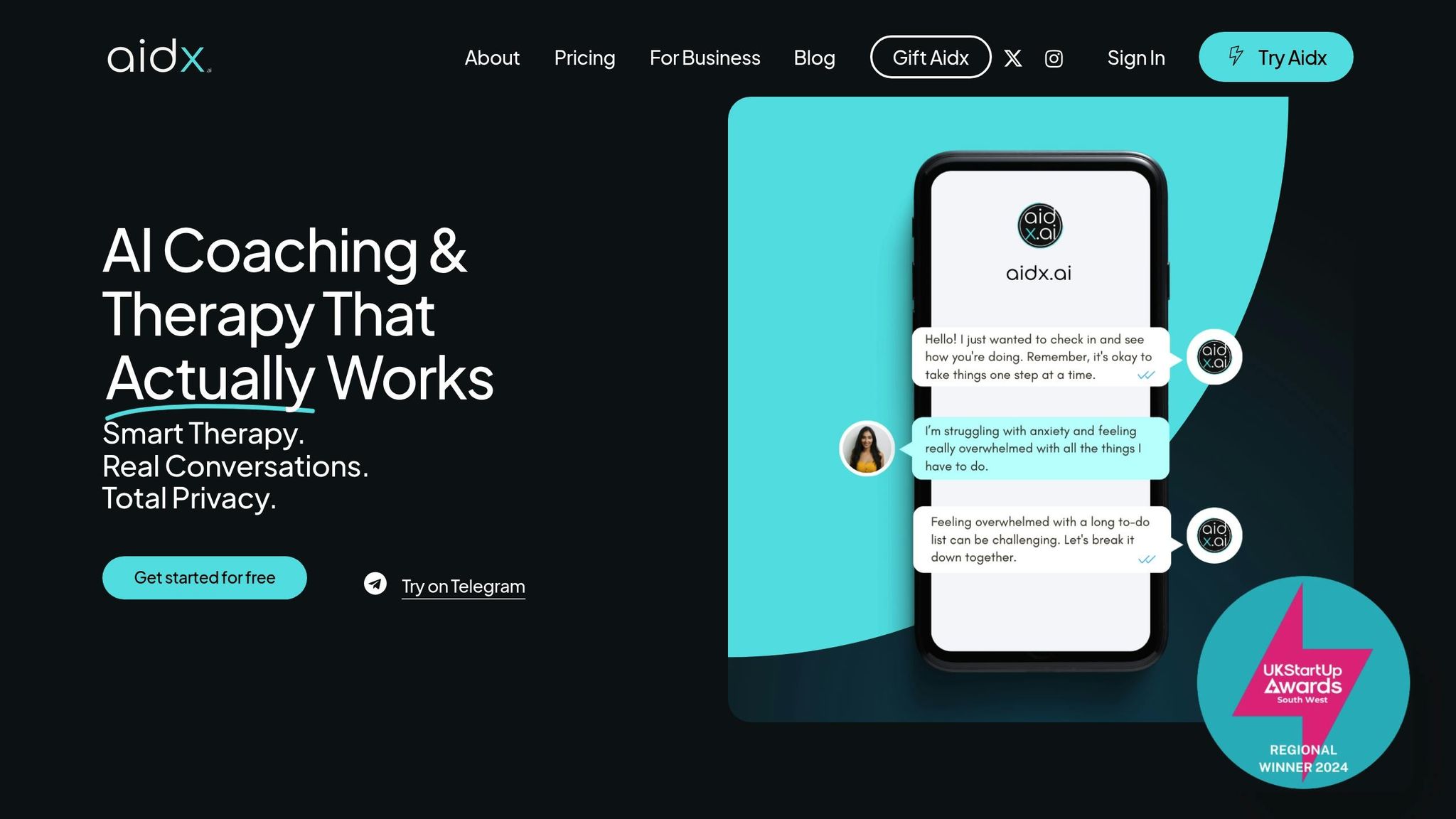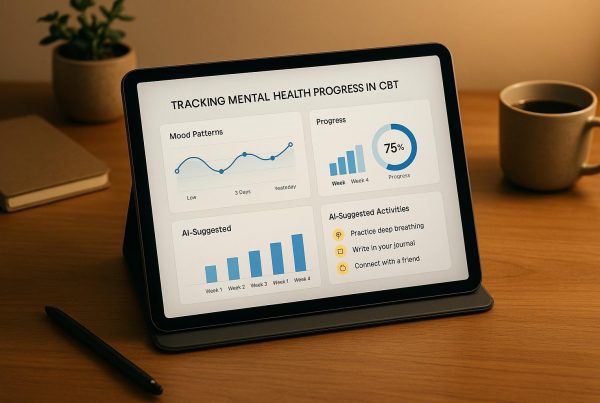AI coaching is transforming mental health support by using validation to build trust. Here’s why it works and how it benefits users:
- 75% of people are open to AI mental health tools, with men 3x more likely to open up to AI than human therapists.
- Validation techniques like empathetic responses, active listening, and personalized guidance create emotional safety and boost user confidence.
- AI tools like Aidx.ai offer 24/7 support, reducing barriers and making therapy 80% cheaper than traditional options.
- Key features include emotional mirroring, contextual memory, and progressive feedback, ensuring tailored, consistent, and natural interactions.
Why it matters: Validation fosters trust, encourages honest self-expression, and improves emotional resilience. AI systems like Aidx.ai continually learn and adapt based on user feedback, offering a reliable and accessible alternative to traditional therapy.
AI for Self Therapy: Creative Uses of AI for Greater Self …
Research on Validation Methods
Studies show that validation techniques improve outcomes in AI coaching. Below, we explore how validation supports mental health and evolves through user feedback.
Mental Health Benefits
Clinical psychologist Cleo Brooks shared her experience with validation in AI coaching:
"After trying it for myself I have found that it has had a positive influence on how I approach my own issues and difficulties… It helped me to see things from a different perspective, reminded me how to problem-solve for myself, and gave me reassurance that there was support that I could rely on".
Key findings from the research highlight these benefits of validation:
| Validation Benefit | Impact on Users | Observed Outcome |
|---|---|---|
| Emotional Safety | Users feel more comfortable sharing | 3x higher disclosure rates among male users |
| Continuous Support | 24/7 availability reduces barriers | 50% fewer obstacles to accessing support |
| Non-judgmental Response | Encourages honest self-expression | Boosted problem-solving engagement |
AI Learning from User Responses
AI systems improve their validation methods by learning from user interactions. Psychologist Vera Martins described her experience:
"I shared a very specific topic and was guided through relevant questions, practical tips and actionable steps. The process was very natural and, above all, it was very useful… It was amazing to see how Aidx managed the specificities of the issue so well".
Research shows AI systems can:
- Analyze emotional content in user responses
- Adapt validation techniques based on feedback
- Maintain ethical standards during interactions
- Provide tailored validation strategies
This learning process allows AI coaching tools to deliver better support, fostering trust and stronger user engagement.
Key Trust-Building Mechanisms
Clear Communication Methods
When users understand how a system works, they’re more likely to trust it. In fact, 75% of people say they’d consider AI-based mental health support if the processes are clearly explained. Aidx.ai ensures transparency by using evidence-based techniques like CBT, DBT, and mindfulness practices, while openly communicating its AI-driven nature.
| Communication Element | Trust Impact | User Benefit |
|---|---|---|
| Therapeutic Framework | Builds credibility | Users see the scientific foundation |
| Process Transparency | Boosts confidence | Sets clear expectations |
| Response Clarity | Improves engagement | Makes guidance easier to follow |
This approach helps create consistent and dependable interactions.
Reliable Response Patterns
Research shows that consistent and immediate support builds trust. For example, 50% of therapy seekers face challenges with appointment availability, making reliable AI coaching a much-needed solution.
AI systems address this by offering:
- 24/7 availability for uninterrupted support
- Standardized therapeutic methods that ensure consistency
- Structured problem-solving techniques to guide users effectively
These reliable responses lay the foundation for trust, while natural conversation techniques take it a step further.
Creating Natural Conversations
"Aidx has been surprisingly human in identifying problems & asking the right questions. But faster! I got sucked into the conversation like I was talking to an educated & empathetic therapist & every suggestion sent me to where I needed to go."
What makes conversations feel natural? A few key elements:
- Empathetic responses that validate emotions
- Contextual understanding that addresses specific user situations
- Flexible communication styles that adjust tone and approach based on user needs
Interestingly, men are three times more likely to open up to AI therapy compared to human therapists, highlighting the importance of these conversational elements.
sbb-itb-d5e73b4
Validation Methods in Practice
Common Validation Approaches
AI coaching systems rely on three main techniques to establish meaningful connections with users. Aidx.ai’s Adaptive Therapeutic Intelligence (ATI) uses the following methods:
| Validation Technique | How It Works | User Benefit |
|---|---|---|
| Emotional Mirroring | Recognizes emotions in real-time and responds accordingly | Helps users feel understood |
| Contextual Memory | Tracks past conversations and insights | Ensures continuity in interactions |
| Progressive Feedback | Adjusts responses based on user engagement | Provides tailored support for growth |
These techniques form the backbone of Aidx.ai’s empathetic AI coaching, which has earned praise from mental health professionals. Quality control measures further reinforce these validation methods, ensuring user trust remains strong.
Quality Control Methods
AI coaching platforms implement strict quality control processes to maintain consistent and reliable validation. These include:
1. Real-Time Response Monitoring
AI systems constantly analyze response patterns and user feedback, making immediate adjustments to ensure interactions remain meaningful.
2. Expert-Backed Verification
Therapeutic frameworks are rooted in established practices like CBT, DBT, and mindfulness techniques.
3. User Experience Tracking
Platforms monitor key metrics to gauge validation success, such as:
- Session engagement time
- Participation in follow-up activities
- Goal completion rates
- Notable improvements in emotional well-being
Mental health professionals have acknowledged the effectiveness of these methods. Salvija, an Abuse Expert and Clinical Hypnotherapist, shared:
"My experience with Aidx was impressive, it offered great support and ideas, was able to have fluent conversations, on top of that it checked in with me… it is a brilliant tool for anyone who needs support quickly and maybe hasn’t found their therapist yet or can’t afford a session for the moment. It is truly game changing and will shake the industry very quickly."
These validation practices have built strong user trust, with 75% of individuals expressing openness to AI-driven mental health support. The combination of reliable validation techniques and robust quality control creates a solid base for impactful therapeutic interactions.
Measuring Validation Success
User Participation Results
Recent data highlights how validation techniques enhance engagement with AI coaching platforms. These methods not only increase participation but also build greater trust among users.
For example, 75% of individuals are open to using AI-driven mental health support. This acceptance is especially strong among male users, who are three times more likely to engage with AI therapy compared to traditional human therapists.
Accessibility plays a key role in maintaining this engagement. AI coaching, available 24/7, fills a critical gap where half of therapy seekers face challenges finding timely support. This round-the-clock availability has led to more consistent user participation.
| Engagement Metric | Impact |
|---|---|
| Cost Accessibility | 80% lower than traditional therapy sessions |
| Availability | 24/7 instant access vs. limited scheduling |
| Male Engagement | 3x higher openness compared to in-person therapy |
| General Acceptance | 75% willing to try AI mental health support |
In addition to engagement, the platform’s effectiveness is reflected in measurable health improvements.
Health Improvement Data
Engagement metrics align with clear improvements in users’ problem-solving abilities and emotional resilience. Professional evaluations back these findings, showing that the platform significantly enhances overall well-being.
Experts note that features like personalized check-ins and goal-setting tools, aligned with Adaptive Therapeutic Intelligence (ATI) protocols, are key to these outcomes. These tools allow the system to handle complex emotional issues while staying ethical and user-focused.
By combining tailored interactions, structured goals, and multiple therapeutic approaches, the platform supports meaningful personal growth. Its ATI framework ensures that care remains consistent with established therapeutic standards while adapting to individual needs.
The systematic approach to validation not only boosts problem-solving skills but also strengthens emotional resilience. Data confirms that, when properly implemented, AI coaching can be a valuable resource for mental health and self-improvement.
Aidx.ai‘s Validation System

Validation Tools and Methods
Aidx.ai’s Adaptive Therapeutic Intelligence (ATI) uses a mix of techniques like CBT, DBT, NLP, mindfulness, somatic methods, and solution-focused strategies to provide tailored responses. These approaches help build trust and rapport with users.
Here’s how the platform’s validation tools function:
| Validation Feature | Purpose | How It Works |
|---|---|---|
| Personalized Check-ins | Track progress and boost engagement | Automated follow-ups based on user behavior |
| Expert-designed Modes | Address specific needs | Options like Microcoaching, Embodiment, and Incognito |
| Accountability System | Keep users on track | Features like Friday Wins and Monday Goal-Setting |
| Customizable Notifications | Provide consistent support | Multi-channel reminders via web, email, and messaging |
The platform boasts a 75% user acceptance rate for its AI-driven mental health tools. This high rate highlights its success in creating a supportive and professional environment. These tools are seamlessly integrated into ATI, ensuring continuous improvements.
System Updates and Improvements
Aidx.ai refines its validation methods through data-driven updates. Its ATI framework evolves based on user feedback and interactions, ensuring ethical and effective support.
The platform focuses on three key areas for improvement:
| Focus Area | Current Implementation | Ongoing Enhancements |
|---|---|---|
| Response Accuracy | Uses multiple therapy modalities | Regular updates to therapeutic approaches |
| User Experience | Offers customizable interaction modes | Improved conversation memory and context awareness |
| Support Accessibility | 24/7 availability across platforms | Broader channel integration and added language options |
Mental health professionals have validated the system’s capabilities, addressing a crucial gap in access to timely therapy, with 50% of seekers often struggling to find support.
Conclusion: Next Steps in AI Coaching
Advancements in validation methods are reshaping how AI coaching delivers mental health support, making it more accessible than ever. By building trust through proven therapeutic approaches and meaningful interactions, this technology is redefining the way users engage with mental health tools. A deeper dive into how Adaptive Therapeutic Intelligence (ATI) achieves these outcomes is essential.
Aidx.ai’s ATI showcases how blending evidence-based methods with practical tools creates personalized and dependable support. Its approach combines various therapeutic techniques with accountability features, offering users a well-rounded experience.
AI coaching also addresses common barriers to traditional therapy. With therapy sessions often being costly and hard to access, AI coaching emerges as a practical alternative – offering immediate assistance at roughly 80% less than conventional options.
These findings highlight the importance of continually improving validation methods to broaden the reach of AI coaching. The ability to deliver personalized, on-demand support while adhering to professional standards is changing the landscape of mental health care.
Looking ahead, the focus will be on refining validation techniques, expanding therapeutic options, and enhancing personalization. As technology evolves, AI coaching platforms are set to play a growing role in mental health support and personal development.



